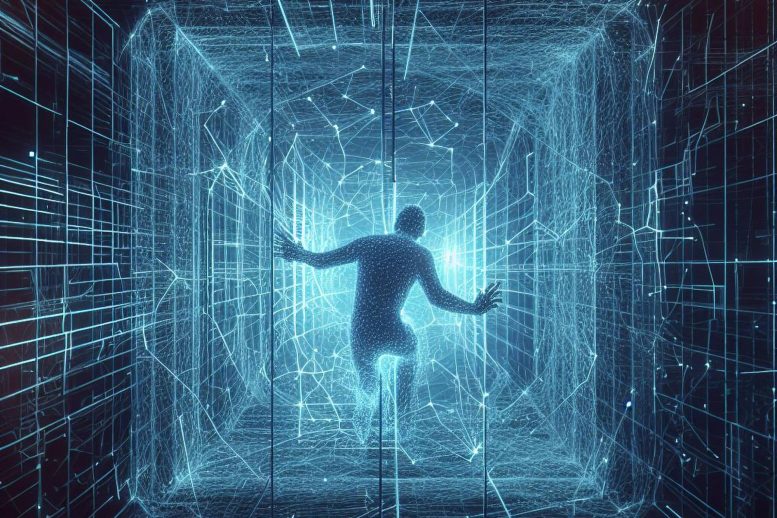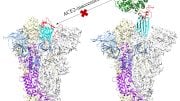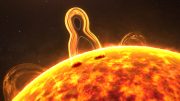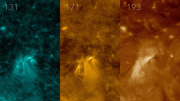
Dr. Melvin Vopson, a physicist from the University of Portsmouth, has proposed a new law of physics that might support the theory that our universe is a simulated reality. Drawing from the field of information physics, he suggests that physical reality is composed of bits of information. His latest research suggests that this new law, based on principles of thermodynamics and information dynamics, has implications across biology, atomic physics, and cosmology.
A new study explores the simulated universe hypothesis and its implications for science and technology.
A University of Portsmouth physicist has explored whether a new law of physics could support the much-debated theory that we are simply characters in an advanced virtual world.
The simulated universe hypothesis proposes that what humans experience is actually an artificial reality, much like a computer simulation, in which they themselves are constructs.
The theory is popular among a number of well-known figures including Elon Musk, and within a branch of science known as information physics, which suggests physical reality is fundamentally made up of bits of information.
Dr. Vopson’s Groundbreaking Findings
Dr. Vopson has a history of pioneering research. He previously published a study suggesting that information has mass and that all elementary particles – the smallest known building blocks of the universe – store information about themselves, similar to the way humans have DNA.
In 2022, he discovered a new law of physics that could predict genetic mutations in organisms, including viruses, and help judge their potential consequences.
It is based on the second law of thermodynamics, which establishes that entropy – a measure of disorder in an isolated system – can only increase or stay the same.
Dr. Vopson had expected that the entropy in information systems would also increase over time, but on examining the evolution of these systems he realized it remains constant or decreases. That’s when he established the second law of information dynamics, or infodynamics, which could significantly impact genetics research and evolution theory.
Applications and Implications
A new paper, published on October 6 in AIP Advances, examines the scientific implications of the new law on a number of other physical systems and environments, including biological, atomic physics, and cosmology.
“What I wanted to do next is put the law to the test and see if it could further support the simulation hypothesis by moving it on from the philosophical realm to mainstream science.”
— Dr. Melvin Vopson, University’s School of Mathematics and Physics
Dr. Vopson, from the University’s School of Mathematics and Physics, said: “I knew then that this revelation had far-reaching implications across various scientific disciplines.
“What I wanted to do next is put the law to the test and see if it could further support the simulation hypothesis by moving it on from the philosophical realm to mainstream science.”
Key findings include:
- Biological Systems: The second law of infodynamics challenges the conventional understanding of genetic mutations, suggesting that they follow a pattern governed by information entropy. This discovery has profound implications for fields such as genetic research, evolutionary biology, genetic therapies, pharmacology, virology, and pandemic monitoring.
- Atomic Physics: The paper explains the behavior of electrons in multi-electron atoms, providing insights into phenomena like Hund’s rule; which states that the term with maximum multiplicity lies lowest in energy. Electrons arrange themselves in a way that minimizes their information entropy, shedding light on atomic physics and stability of chemicals.
- Cosmology: The second law of infodynamics is shown to be a cosmological necessity, with thermodynamic considerations applied to an adiabatically expanding universe supporting its validity.
“The paper also provides an explanation for the prevalence of symmetry in the universe,” explained Dr. Vopson.
“Symmetry principles play an important role with respect to the laws of nature, but until now there has been little explanation as to why that could be. My findings demonstrate that high symmetry corresponds to the lowest information entropy state, potentially explaining nature’s inclination towards it.
“This approach, where excess information is removed, resembles the process of a computer deleting or compressing waste code to save storage space and optimize power consumption. And as a result, supports the idea that we’re living in a simulation.”
Linking Information to the Universe’s Fabric
Dr. Vopson’s previous research suggests that information is the fundamental building block of the universe and has physical mass. He even claims that information could be the elusive dark matter that makes up almost a third of the universe, which he calls the mass-energy-information equivalence principle.
The paper argues the second law of infodynamics lends support to this principle, potentially validating the idea that information is a physical entity, equivalent to mass and energy.
“The next steps to complete these studies require empirical testing,” added Dr. Vopson.
“One possible route would be my experiment devised last year to confirm the fifth state of matter in the universe – and change physics as we know it – using particle-antiparticle collisions.”
Reference: “The second law of infodynamics and its implications for the simulated universe hypothesis” by Melvin M. Vopson, 6 October 2023, AIP Advances.
DOI: 10.1063/5.0173278









Just like a stack of digital chips extending in all directions “the possibilities are endless”.
He didn’t come up with either concept. I already had material published on Academia.edu under Dual Direction Entropy that has explicitly said this. And I doubt that I am first. But I beat this PhD by a couple years, and went further…. I have established rigorous philosophical basis, verified in its uniqueness by the GPT with Internet access. My work is uploaded to CERN as well, and is only accelerating. Not saying he plagiarized me. But he is definitely producing aere shadow of the EPEMC corpus’ framework. He doesn’t even yet know about the 1.32 x 10^-60 m k-Gurvature (as I call it) relating to electrical information found applying charge to gravitic. The empirical, future and space interested philosophy is called MIMS and Musk asked for it…. A full year after I started it. The first full fledged philosophy born of empiricism.
DOI: 10.5281/zenodo.7818692
Yes. While I think the whole idea is “fringe”, I am particularly annoyed that publications like this use Musk to get clicks. He is not the genius people make him out to be. You come up with an idea that leads to money and then you throw money at ideas until someone else makes them work for you is not evidence that Musk has some special insight into everything. MANY of his ideas are absolute failures and people ignorantly still flock to this a-hole for his “insights”. Pathetic.
A new law of What stretching into insanity not creativity
Another fascinating and delightfully clueless victim of bent spacetime gravity.
“… could prove Nick Bostrom is right”.
https://simulation-argument.com/simulation
Or even “… could prove Descartes was right”.
Choose you pill.
Just another infinite regress ‘solution’, since there has to be an agent making the simulation, with its own history, and it requires to be accounted for, as the original, or a new layer of simulation. Ad infinitem.
‘They’ just can’t stop trying to dehumanise us and hustle us into digital slavery as cyborgs and avatars.
So who’s controlling the computer game we’re all supposedly in. And are they just a simulation, too.
As a potential new religion, this Great Game Thory is about as believable as the old ones, without the saving graces.
This idea, which is not new, has a slightly metaphysical angle, little relevance to physics, and little if any substance at all. The authors would be lost defining origins of information-rich systems, e. g. life forms. Nobody did that with a considerable degree of success in physics (including simulations). Maybe some baby steps can be attributed to Hoyle and Penrose. Let me know who else I am missing here. For now, two prevailing approaches seemingly providing an explanation have almost no bearing on reality and meaning – both Darwinian and theological “explanations” (btw, the former should be included in the latter to be exact) are just laughable pretenses because they both are mere tautologies lacking any explanatory power, however loud they claim a plethora of evidence, tradition, a massive following, continued success, etc. Random shuffling does not create information: select as much as you want you will not get anything besides maybe a very primitive sequence (not long enough to code for a short peptide, let alone an organism). Alternatively, if you refer to God – go define what by definition is indefinable, above and beyond any and all definitions, including reality, existence, and morality too, however you define those. I bet the authors will not define what a simulation is either, to any satisfactory degree.
“ New Law of Physics Could Prove Elon Musk Is Right” Really? Is he the one that came up with this hypothesis? I think not!
amen!
Amen x 2
Spaghetti!
https://scitechdaily.com/is-our-reality-a-computer-simulation-a-new-law-of-physics-could-prove-elon-musk-is-right/#comment-807494
Consider a Lagrangian spanning between a mountaintop and a valley, requiring variable gravity. If the Lagrangian handles more than one rate of time then it’s a pretty safe bet that at least time is artificial, regardless of any atomic clock comparison assumptions that would be highlighting the issue. Same thing with a Hamiltonian to account for photon exchanges up and down a hill, there’s potentially a realization that a vacuum light-wave property can be changed without changing any objective time rate basis. It’s not merely a very tiny perceptual paradigm shift, there are massive ego implications including a complete loss of low energy physics “spookiness” and cosmic egg mysticism at risk. In other words, time in physics is basically imaginary and ego-driven.
Why is Gregory Bateson’s work is so little-known? He identified cybernetic (information-processing) system’s tendency towards order… many decades ago. He called it “neg-entropy”.
Second: “supports the idea that we’re living in a simulation” (?!?) is a hell of a leap; I’d say someone’s mistaken the map for the terrain. It only supports the idea that western science has been overlooking/ignoring information-handling processes.